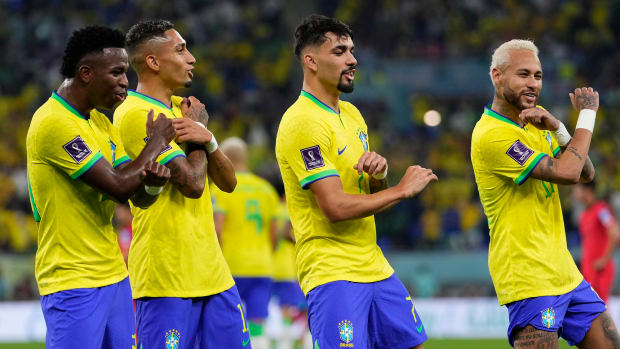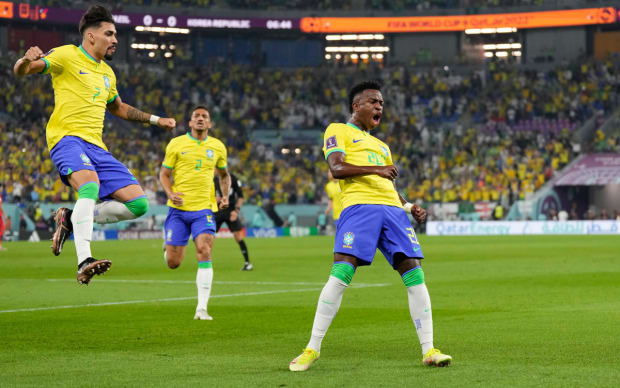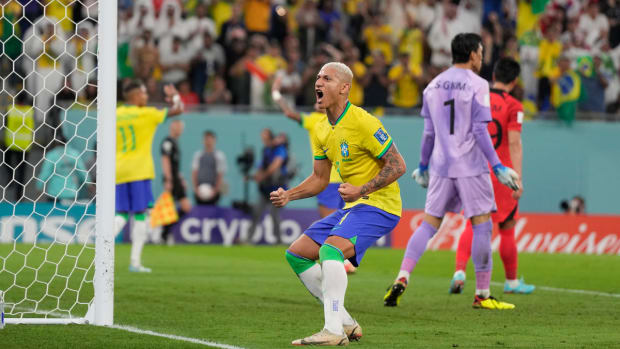The Seleção spirit was all over Brazil’s 4–1 rout of South Korea, which sealed a quarterfinal berth in dazzling fashion—but Croatia may not be so forgiving.
DOHA, Qatar — After all the bold talk of the coming of a new world order, all the over-excited claims about the rise of Africa and Asia, the last three days have come as something of a reality check. The establishment has struck back. Brazil’s dominant 4–1 win over South Korea means that, unless Morocco shocks Spain on Tuesday, the quarterfinals will be made up of a familiar mix of two South American giants (Brazil, Argentina) plus half a dozen sides from Europe (France, England, Netherlands, Croatia, Spain, Portugal/Switzerland).
It was, in truth, always a stretch to expect South Korea to challenge Brazil. It did, after all, lose 5–1 to Brazil in a friendly in June. Its group was the strangest at this World Cup, shaped as much by the two penalties given to Portugal—one very soft, one plain wrong according to the International Football Association Board guidelines—as by the capacities of the teams. South Korea made it through by surviving for a 0–0 draw against Uruguay, which hit the post against it twice, and then beating a Portugal side that had already qualified. Here, frankly, it did not put up much of a fight, a last-16 forum turned into more of a Brazilian dance party.

Manu Fernandez/AP
Paulo Bento, the South Korea coach, pointed to the lack of preparation time available to his side after Friday’s win over Portugal. He will now leave his post, a decision he said he had taken in September.
Neymar’s return after an ankle injury—he said he had felt “no pain” during the game—meant a return to the midfield that had begun Brazil’s first game, against Serbia. That meant Casemiro anchoring, flanked by Neymar and the slightly more defensively minded Lucas Paquetá. Casemiro has been in spectacular form for Manchester United this season, but that still seems like a flimsy screen for the back four. It hardly mattered. Whether Brazil is actually tournament-winning good will have to wait; for now what can clearly be said is that it is far, far better than South Korea. Its players celebrated at the end with a banner bearing Pelé’s name, a touching gesture for the 82-year-old, who has been hospitalized all while his family members downplay reports of his imminent death. It was said he would be watching Monday’s match from the hospital in São Paulo, and what he—and team legends Rivaldo, Roberto Carlos, Cafu and Ronaldo, who were in attendance—saw was the Brazilian spirit on full display.

Jin-Man Lee/AP
Tite, the Brazil coach, praised “the offensive boldness of this team. They are bold, they play individual football, which is impressive. They are balanced and aware they have a good equilibrium and they know that if they lose balance it might be fatal in this competition.”
Assistant coach César Sampaio added “ball recovery” as another area in which Brazil had excelled, while Tite said his only concern was the “efficiency” of his side.
It took just seven minutes for Brazil to take the lead in a first half that dazzled and mesmerized unlike any period of play at this World Cup to date. Neymar missed Raphinha’s cutback at the near post, so the ball ran to Vinícius Júnior, who very calmly side-footed his finish into the top corner as Korean bodies hurled themselves in the way. What South Korea then didn’t need was to concede an entirely avoidable penalty. Jung Woo-young wasn’t aware of Richarlison’s presence as he sought to clear the ball, and when the Tottenham forward nipped in, Jung whacked him on the back of the ankle. Neymar and South Korea goalkeeper Kim Seung-gyu both dawdled and skipped about before Neymar rolled the penalty in after a lengthy run-up to pull within one of Pelé’s national men’s scoring record (77 goals). It was 2–0, and the game was effectively done after 13 minutes.

Jin-Man Lee/AP
What followed was an exhibition, which was all very entertaining but said far more about South Korean deficiencies than about Brazil, other than that, faced with a porous defense, it is capable of playing football of exceptional beauty. The third goal arrived after 29 minutes, with Richarlison heading the ball to himself three times before pushing it out to Marquinhos. He squared it for Thiago Silva, who completed the triangle by laying in Richarlison to score. Lucas Paquetá got the fourth, finishing a late-arriving run with a side-footed volley from Vinicius’s cross in the 36th minute, and South Korea could only dream of halftime for a reprieve.
World Cup 2022: Schedule and TV coverage.
The second half was a non-event after that. Brazil was even able to bring on Weverton, the third-string goalkeeper, just to give him some minutes in the tournament and ensure that all 26 players on Tite’s squad had seen the field in Qatar. There were Korean chances, including the long-range Paik Seung-ho drive that made it 4—1 with 14 minutes left but largely, you sensed, because Brazil’s minds weren’t really on the job. There were Brazilian chances that weren’t taken because the game was already won and everybody was trying to do something spectacular.
Brazil will be a strong favorite in Friday’s first quarterfinal against Croatia, the 2018 runner-up and a survivor in penalty kicks after a duel with Japan. The veteran and tested side should at least offer more rugged opposition and ensure that if even if Brazil is to go through, it won’t be comfortably breaking into the samba on its way.